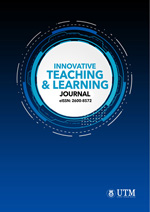Submissions
Submission Preparation Checklist
As part of the submission process, authors are required to check off their submission's compliance with all of the following items, and submissions may be returned to authors that do not adhere to these guidelines.- The submission has not been previously published, nor is it before another journal for consideration (or an explanation has been provided in Comments to the Editor).
- The submission file is in OpenOffice, Microsoft Word, or RTF document file format.
- Where available, URLs for the references have been provided.
- The text is single-spaced; uses a 12-point font; employs italics, rather than underlining (except with URL addresses); and all illustrations, figures, and tables are placed within the text at the appropriate points, rather than at the end. Please refer to the "ITLJ article template file" in the Author Guidelines.
- The text adheres to the stylistic and bibliographic requirements outlined in the Author Guidelines.
- Abtract in Bahasa Melayu and English for article written using Bahasa Melayu.
-
The manucript has been checked for plagiarism by the author. The similarity index must be less than 20%.
The editors will recheck the similarity index using Turnitin. Manuscript that not pass the maximum similarity index will be returned to authors.
Articles
Section default policyPrivacy Statement
The names and email addresses entered in this journal site will be used exclusively for the stated purposes of this journal and will not be made available for any other purpose or to any other party.
















